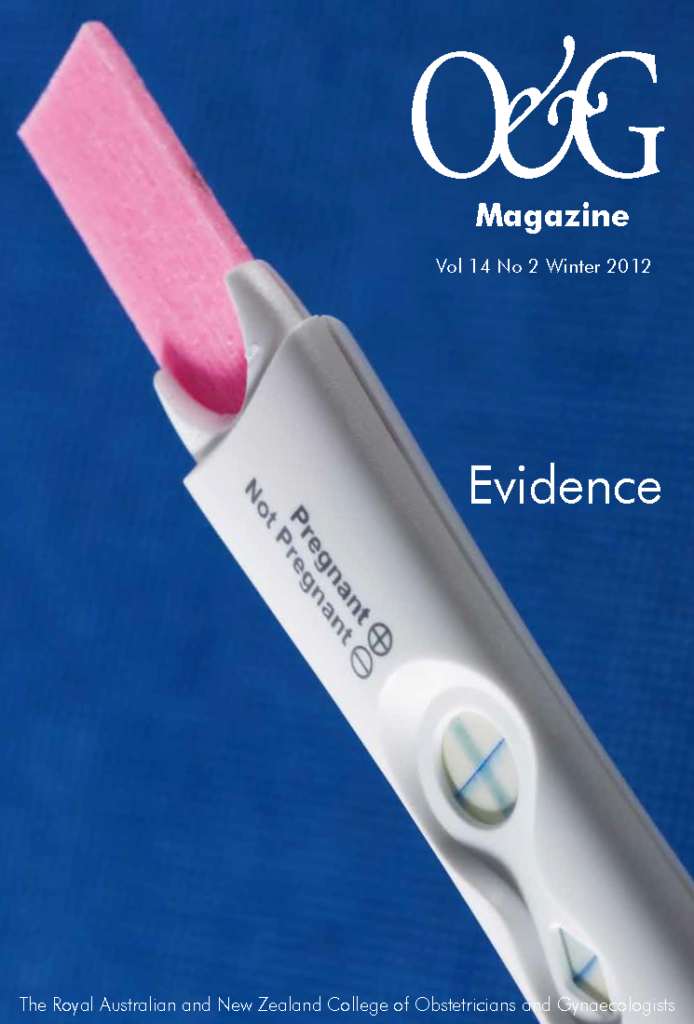The origins of evidence-based healthcare began with collaborative work in perinatal medicine. This has evolved into a worldwide organisation, with a maintained database, that is readily accessible, promoting the use of up-to-date evidence.
The origins of evidence-based healthcare began with collaborative work within perinatal medicine. The value of systematic review of controlled trials was recognised more than 30 years ago. This has evolved into a worldwide organisation, with a maintained database, that is readily accessible, promoting the use of up-to-date evidence.
The earliest recollection I have of the Cochrane concept of systematic review of evidence was the 1989 publication Effective Care in Pregnancy and Childbirth (ECPC) by Chalmers et al.1 The history of the evolution of the Cochrane collaboration predated this by some years.
British epidemiologist Prof Archie Cochrane first drew the medical profession’s attention to a ‘collective ignorance about the effects of healthcare’ in 1972.2 In an essay, in 1979, he stated, ‘it is surely a great criticism of our profession that we have not organised a critical summary, by specialty or subspecialty, adapted periodically, of all relevant randomised controlled trials.’ Prof Cochrane identified obstetrics as the least scientifically based specialty. The Cochrane Collaboration is named in honour of him for his significant contribution to the development of epidemiology as a science.
Collaborative work
The first collaborative work to systematically review controlled trials occurred in perinatal medicine. In 1978, the National Perinatal Epidemiology Unit in Oxford, UK, was founded to assemble a register of controlled trials. By 1985, over 3500 reports of controlled trials in perinatal medicine had been classified, the results published, publication bias investigated and unpublished controlled trials identified. Between 1985 and 1990, an international collaborative effort was underway to systematically review controlled trials in pregnancy, childbirth and the neonatal period. This culminated in the publication of ECPC as well as A Guide to Effective Care in Pregnancy and Childbirth and the Oxford Database of Perinatal Trials (ODPT). In 1992, The Cochrane Centre was established in Oxford (later renamed the UK Cochrane Centre) to facilitate systematic reviews of randomised controlled trials (RCTs). The Pregnancy and Childbirth Group and Subfertility Group was registered.
Corticosteroid trial
The well-recognised Cochrane logo has at its inner core a graphic representation of the outcome of a systematic review of data from a set of RCTs. The review analysed trials investigating the use of corticosteroids prior to premature birth. The first of the trials was published by New Zealand researchers Liggins and Howie in 1972.3 By 1991, seven more trials had been reported with the combined picture indicating strongly that corticosteroids reduce the risk of babies dying from complications of immaturity. The odds of these babies dying from complications of immaturity were reduced by 30–50 per cent. Before 1989, there had been no systemic review of the trials available and most obstetricians had not realised that the treatment was so effective.
Evidence-based medicine expands
Work in the perinatal field gave the impetus to progress the pursuit of evidence-based medicine. It has expanded to include most branches of medicine and related fields. These include over 40 groups ranging from oral health, inflammatory bowel disease, wounds, screening and diagnostic test methods dementia and cognitive impairment, tobacco addiction, cystic fibrosis, hepatobiliary and healthcare of older people, just to name a few. In 1995, an article in the Lancet had suggested, ‘the Cochrane Collaboration is an enterprise that rivals the human genome project in its potential implications for modern medicine.’4 In March 2012, the number of Cochrane reviews in the database exceeded 5000. There are more than 28 000 people working within the Cochrane Collaboration in over 100 countries, of whom 70 per cent are authors of Cochrane Reviews.
The Cochrane Collaboration
The Cochrane Collaboration is an organisation that is not for profit, established in 1993, to promote, produce and disseminate systematic reviews of healthcare interventions. The term ‘collaboration’ was used to denote that the organisation benefits from teamwork within many independent groups worldwide. It fosters good communication and open decision-making, reduces barriers to contributing and encourages diversity.
The Cochrane Library
The Cochrane Library is a collection of databases in medicine and other healthcare specialities provided by the Cochrane collaboration (and other organisations). At the core of the collection are the Cochrane reviews, a database of systematic assessments of evidence and meta-analyses that summarise and interpret the results of medical research. The aim of the library is to make the results of well-conducted controlled trials readily available and it is a key resource for evidence-based medicine.
Accessibility
Textbooks and review publications tend to become out of date and unreliable. The original Cochrane reviews were developed as electronic publications. Between 1989–92 six-monthly CD ROM disks were released to keep the information on systematic reviews updated in the form of an electronic journal: the ODPT.
The Cochrane Collaboration publications have been made available free to all residents by ‘national provision’ in several countries, including New Zealand, Australia, India, South Africa, the UK, Ireland, Scandinavian countries, Canada and Poland. There is free access in much of Latin America. All countries have free access to page abstracts of all Cochrane reviews and short plain language summaries of selected articles, the latter is a defining feature of the Cochrane database.
Funding
The Cochrane library is a subscription-based database, originally published by Update Software, now part of the Wylie online system. The funding of the organisation’s central function is royalties from its publisher that come from sales of subscriptions. There are a large number of governmental institutional and private funding sources, but there is a policy to limit uses of funding from corporate sponsors.
The past and present
The Cochrane collaboration has over 50 groups of dedicated professionals (the Cochrane Review Group). The groups produce all the systematic reviews and protocols that are located in the Cochrane database of systemic reviews (Cochrane reviews). The collaboration ‘achieves results by people co-operating with each other, setting aside self-interest and working together to provide evidence with which to improve healthcare.’
Our College has two Fellows who must be acknowledged for their past and ongoing involvement with the Cochrane Collaboration. Caroline Crowther, professor in the discipline of O and G, at the University of Adelaide, is a member of The Cochrane Pregnancy and Childbirth Group. She is a recipient of the prestigious Ann Anderson award for her contributions to the Cochrane Collaboration. She has recently co-authored ‘Pregnancy and Childbirth’, a pocketbook based on the Cochrane database.5 Cindy Farquhar, clinical professor of O and G at the University of Auckland School of Medicine, is a co-ordinating editor of the Cochrane Menstrual Disorders and Subfertility Group. A recent Cochrane review she co-authored is ‘Caesarean Delivery for the Prevention of Anal Incontinence.’6
References
- Chalmers I, Enkin M, Keirse MJNC. Effective Care in Pregnancy and Childbirth. Vol 1. New York: Oxford University Press; 1989.
- The Cochrane Collaboration: Working together to provide the best evidence for healthcare. http://www.cochrane.org .
- Liggins GC, Howie RN. A controlled trial of antepartum glucocorticosteroid treatment for prevention of the respiratory distress syndrome in premature infants. Pediatrics. 1972, 50: 515-525.
- Nayler CD. Grey zones of clinical practice: some limits to evidence-based medicine. Lancet 1995; 345: 840-2.
- Hofmeyr G, Neilson J, Alfirevic Z, Crowther C. A Cochrane Pocketbook: Pregnancy and Childbirth (2008). John Wiley and Sons, Ltd, Chichester, UK.
- Nelson R, Furner S, Westercamp M, Farquhar C. Caesarean Delivery for the Prevention of Anal Incontinence (2010). Number 2 Cochrane Database of systematic Reviews, John Wiley and Sons, Ltd.






Leave a Reply